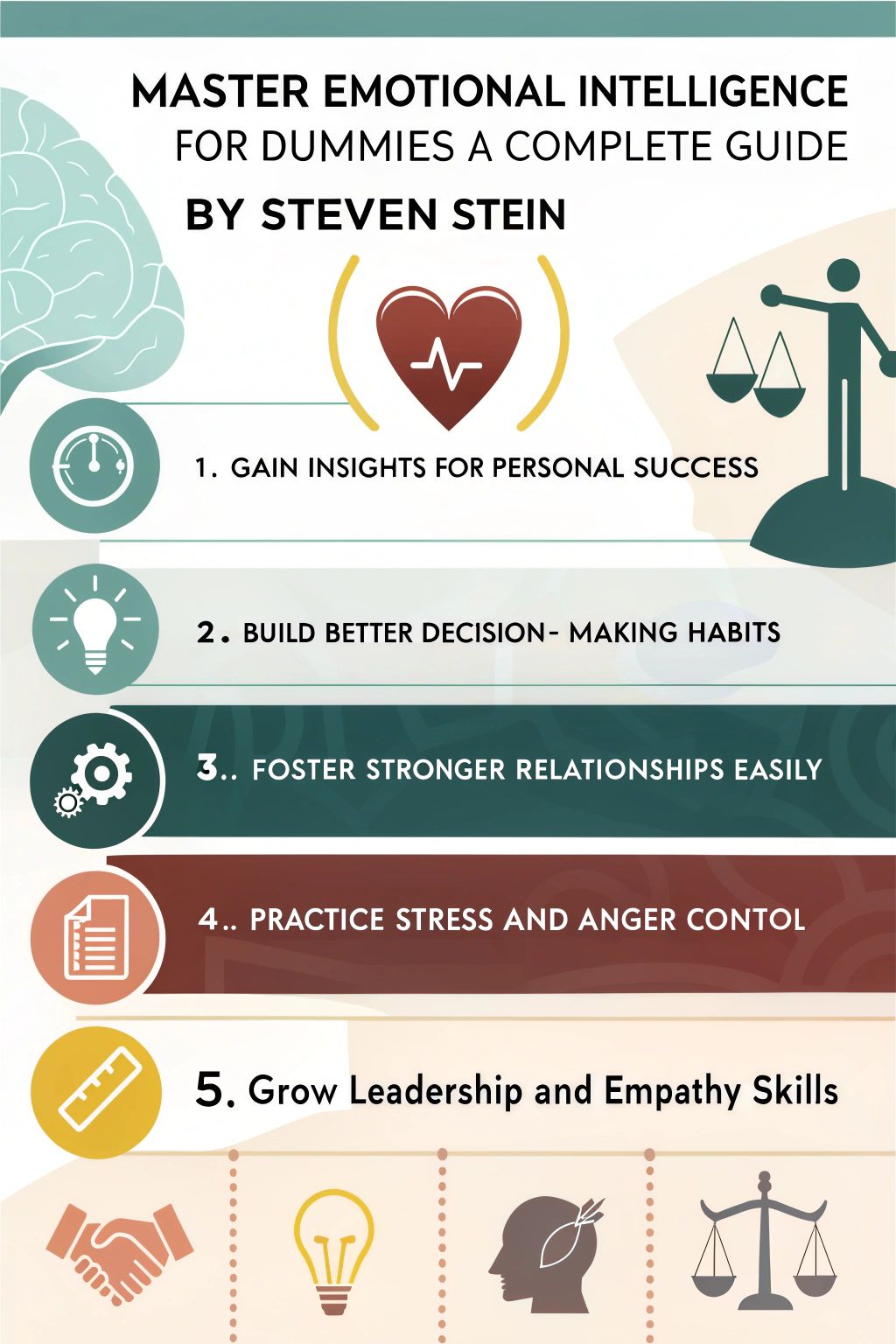Many individuals find it challenging to manage their emotions effectively, facing difficulties in their professional and personal spheres alike. This issue is common amongst us. The book “Emotional Intelligence For Dummies” could be beneficial.
Authored by Steven J. Stein, “Emotional Intelligence For Dummies” provides insights on enhancing your comprehension of personal emotions and those of others. Our article aims to illustrate how this book could increase your emotional acumen, offering functional tactics.
The guide is straightforward and user-friendly. Continue reading for more insights.

Understanding Emotional Intelligence

Understanding emotional intelligence is essential in navigating personal and professional relationships. By comprehending the definition and significance of emotional intelligence, individuals can develop valuable insights into how it can be applied to raise children, manage emotions at work, and improve their mental health.
Definition and Importance
Emotional intelligence (EQ) is the ability to comprehend, utilise, and control one’s own emotions in constructive ways. This encompasses self-soothing when distressed, uplifting others, and making judicious choices about what matters most.
John D. Mayer and Peter Salovey presented this concept in 1990. They illustrated how vital EQ is for achievement in life, profession, and relationships.
Possessing high emotional intelligence assists in understanding one’s emotional state and the emotions of those around them. This cognizance can result in improved decision making, enhanced mental wellbeing, and robust relationships.
Instruments like the MSCEIT (Mayer-Salovey-Caruso Emotional Intelligence Test) provide a method to assess these capabilities. From its inception over thirty years ago, researchers have written more than 750 papers on the advantages of EQ across multiple facets of life, from managing workplace stress to fostering empathy towards others.
Key Components of Emotional Intelligence
Understanding and managing your sentiments are important aspects of emotional intelligence. Individuals with an elevated emotional quotient (EQ) possess the competence to handle challenging circumstances effectively.
They have the skill to converse with others in a manner that’s both impactful and compassionate. These people maintain their composure, even amidst tense situations. The updated EQ-i 2.0® model suggests that being aware of your feelings and regulating them is merely the initial step.
To truly champion emotional intelligence, one must also have the ability to motivate oneself, maintain a positive attitude, and comprehend the emotions of others. This involves perceiving situations from their standpoint and responding with empathy.
Those possessing a high EQ utilise these skills on a daily basis to make superior decisions, establish robust relationships, and enjoy more content lives. Repeated practice is beneficial for those who might not naturally possess these skills yet.
Practical Applications of Emotional Intelligence
Mastering emotional intelligence is crucial and can be effectively utilised in various domains, including managing emotions in the workplace, enhancing personal relationships, and refining leadership skills. Acquiring emotional intelligence empowers individuals with valuable perspectives on comprehending their own and others’ emotions, resulting in enhanced interactions and more efficient communication.
Managing Emotions in the Workplace
In the workplace, managing your emotions is key. It helps in building teams that understand each other well. The U.S. Air Force and FBI Academy use strategies to keep a good work-life balance.
They also create groups that are smart about their feelings. These practices make sure everyone can share ideas freely and support one another.
Using emotional intelligence at work means you can handle tough times better. Companies like American Express teach their staff how to stay calm under pressure. This skill lets them solve problems without getting too stressed or angry.
When people know how to control their emotions, they feel happier at work. This leads to better performance all around.
Improving Personal Relationships
Emotional intelligence has a significant role in enhancing personal relationships. Grasping and handling your emotions enable you to react to others more efficiently. For instance, Claudio’s harmful emotional stimuli at home exhibit the need for self-awareness within relationships.
Recognising these triggers can help avoid needless arguments with family members.
Parents can also apply emotional intelligence to better establish a connection with their partners and offspring. Methods encompass handling personal emotions and attempting to comprehend a partner’s point of view on issues.
This method propagates a supportive environment at home where everyone feels acknowledged and cherished. Educating offspring about emotional cognisance and impulse management sets them up for more positive societal interactions outside the familial sphere.
Through these pragmatic steps, families form more robust ties based on empathy, respect, and comprehension.
Enhancing Leadership Skills
Leaders with strong emotional intelligence motivate their teams better. They understand how to read the room and adjust their strategies. This makes everyone feel seen and important.
To boost leadership skills, one must first gauge their own leadership qualities honestly. Next, they work on improving these areas through practical exercises.
Developing a leader’s ability to influence is key too. Gaining respect from peers comes from showing empathy and understanding towards them. Leaders at big companies like American Express have seen success by applying these techniques.
They manage emotions in high-stress environments effectively, leading by example.
Techniques to Enhance Emotional Intelligence
Improving your emotional intelligence entails mastering practical methods that enable enhanced self-awareness, stress regulation, and empathy cultivation. Acquiring a grasp of these approaches aids in effectively managing emotions and enhancing personal and professional relationships.
Self-awareness Strategies
Practising self-awareness is the primary element of emotional intelligence. It involves a thorough observation of your own feelings and reactions in a variety of situations. This strategy aids you in comprehending the cause behind your reactions and what provokes those responses.
An advantageous first step is to maintain a diary to record your emotions and their origins. This activity, anchored in the scientific principles of EQ, enhances your emotional self-awareness considerably.
A further efficient method includes self-evaluation tools that gauge your emotional responses and pinpoint personal triggers. These tools provide beneficial information into your method of dealing with stress, interaction with others, and handling challenges.
By gaining knowledge of these facets of yourself, you can handle your emotions more effectively, resulting in improved decision-making and more robust relationships in both career and personal life.
Continuous use of these strategies allows everyone to develop indispensable emotional skills for attainment in life.
Techniques for Managing Stress and Anger
Counting to ten helps manage irritation by giving the mind a moment to relax. This straightforward technique can halt an immediate furious reaction, making room for more composed responses.
Imagining serene situations also redirects the mind from challenging factors, promoting serenity in stressful situations. For those who see humour as an escape from tension, deploying it judiciously can alleviate irritability and boost the mood.
Breathing exercises serve as a direct pathway to soothing the nervous system, reducing both stress and annoyance levels swiftly. Altering perspectives on difficulties allows viewing them in a fresh light, aiding in fostering more positive outlooks.
Diverting strategies like concentrating on different tasks for a while divert attention from the sources of vexation. Paying attention to body language cues such as tight fists or potent eye contact enables individuals to tackle their emotional state before it heightens.
Developing Empathy and Social Skills
Empathy and social skills are vital for nurturing meaningful connections with others. Demonstrate empathy to cultivate emotionally intelligent children, prompting them to acknowledge and comprehend others’ feelings.
Communicate clearly and uphold positivity when engaging with peers or colleagues – this helps in establishing trust and rapport. Understanding your work style, preferred interaction times, locations, and the capability to set appropriate boundaries during interactions while upholding professionalism for efficient communication is essential.
Cultivating empathy involves grasping emotions through facial expressions and being sensitive to others’ emotional signals. Social skills empower individuals to manoeuvre through different social situations effectively, promoting positive relationships at home or work.
Practising empathic language can be pivotal in managing personal relationships and enriching leadership abilities.
Emotional Intelligence for Teens
Teens can benefit notably from developing emotional intelligence. By teaching children how to be emotionally aware and manage stress and anger, parents can equip them with vital skills for navigating personal relationships and realising personal happiness.
Furthermore, modelling empathy to teens and providing practical guidance on understanding their own feelings can aid in the development of emotional intelligence during this critical stage of life.
Benefits of Mastering Emotional Intelligence
Mastering emotional intelligence offers a range of benefits, including improved mental health, better decision-making abilities, and enhanced career opportunities. Understanding and managing emotions can lead to more meaningful relationships and overall success in life.
Better Decision Making
Emotional intelligence plays a vital role in better decision-making. Individuals with high emotional awareness are skilled at understanding their own and others’ emotions, enabling them to make more informed choices.
Research has shown that those who display higher levels of emotional intelligence tend to exhibit improved decision-making abilities across various facets of life, including professional and personal domains.
By acknowledging the impact of emotions on their judgments, individuals can navigate complex situations with increased clarity and precision, leading to more favourable outcomes.
In addition, integrating emotional intelligence into decision-making processes fosters an environment of empathy and understanding, which is particularly beneficial in leadership roles and team dynamics.
It allows leaders to consider diverse perspectives while making decisions, resulting in inclusive and well-rounded outcomes. Essentially, by using emotional intelligence as a guiding force in decision-making, individuals can cultivate environments that not only enhance productivity but also nurture positive relationships among colleagues or team members.
Improved Mental Health
Mastering emotional intelligence has a profound impact on mental health. Research has shown that individuals with higher emotional intelligence tend to exhibit better psychological health, experiencing reduced levels of stress and anxiety due to their ability to manage emotions effectively.
By understanding and harnessing the key components of emotional intelligence, such as self-awareness, empathy, and stress management techniques, individuals can cultivate a positive outlook on life and increase personal happiness.
This can be particularly beneficial in challenging work environments or personal relationships where the ability to regulate emotions plays a crucial role in maintaining mental well-being.
Additionally, by adopting an optimistic mindset and reframing perspectives through emotional intelligence strategies, individuals are empowered to navigate through turbulent times with resilience.
When facing obstacles at work or in personal lives, having strong emotional skills aids in promoting a sense of solace and stability – essential elements for sustained mental well-being.
Therefore, mastering emotional intelligence not only benefits career success but also significantly contributes to improved mental health outcomes.
Enhanced Career Opportunities
Steven Stein has unveiled a comprehensive guide to mastering emotional intelligence, offering valuable insights into applying emotional intelligence to enhance career opportunities.
With an extensive professional background, including consulting for esteemed entities such as the U.S. Air Force, American Express, and Coca-Cola (Mexico), Steven Stein provides actionable guidance on developing essential emotional skills that enable individuals to thrive in their careers.
Moreover, the significance of emotional intelligence in the corporate world is highlighted by its application at major corporations like Canyon Ranch and CIBC. As a critical skill for career success, enhancing one’s emotional intelligence has been shown to lead to improved decision-making abilities and better management of emotions in workplace settings.
This resource presents practical strategies that have helped professionals across various industries navigate complex workplace dynamics, solidifying its status as an ideal tool for anyone seeking career advancement through enhancing their EQ.
Conclusion
Mastering emotional intelligence is vital for success in personal and professional domains. The detailed guide by Steven J. Stein offers valuable insights into comprehending, managing, and utilising emotions effectively.
By exploring practical applications, such as enhancing relationships and refining leadership skills, the book provides readers with actionable strategies for improving their EQ. Moreover, it integrates the latest research on emotional intelligence, making it an exceptional resource for individuals aiming to navigate today’s intricate social and professional environment.
Revealing the potency of empathy and self-awareness, this guide authentically opens up the wealth of emotional intelligence for all enthusiastic learners.
For more insights on nurturing emotional intelligence during adolescence, visit Emotional Intelligence for Teens.
MindOwl Founder – My own struggles in life have led me to this path of understanding the human condition. I graduated with a bachelor’s degree in philosophy before completing a master’s degree in psychology at Regent’s University London. I then completed a postgraduate diploma in philosophical counselling before being trained in ACT (Acceptance and commitment therapy).
I’ve spent the last eight years studying the encounter of meditative practices with modern psychology.

